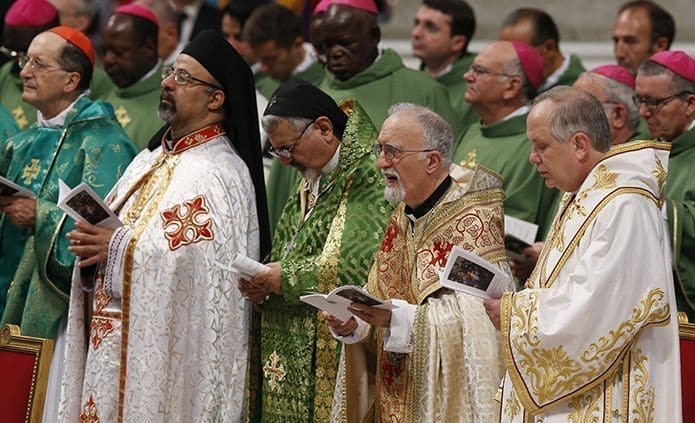 CNS photo/Paul Haring
CNS photo/Paul Haring Vatican City
Look to the East for canonical-spiritual balance, synod members say
By CINDY WOODEN, Catholic News Service | Published October 16, 2014
VATICAN CITY (CNS)—By tapping into its Eastern theological and spiritual traditions, the Catholic Church could find an appropriate way to minister to divorced and civilly remarried Catholics and others in situations the church considers irregular, the head of the Ukrainian Catholic Church said.
“According to the tradition of the Byzantine church, a priest or a bishop is not a judge. His task is not to justify or to condemn somebody, especially in such a delicate area as marriage and family,” Archbishop Sviatoslav Shevchuk, the major archbishop of Kiev-Halych, told reporters Oct. 11. “Our task, our duty is to be spiritual fathers and provide some sort of spiritual healing.”
 Much of the initial discussion at the Synod of Bishops on the family, he said, was “focused on canonical procedures and possibilities—how to help those who were married and then divorced to be more and fully accepted into the Christian communities. But our tradition is mostly focused not in canon law, in canonical procedures, but in the spiritual and aesthetical guidance of Christians.”
Much of the initial discussion at the Synod of Bishops on the family, he said, was “focused on canonical procedures and possibilities—how to help those who were married and then divorced to be more and fully accepted into the Christian communities. But our tradition is mostly focused not in canon law, in canonical procedures, but in the spiritual and aesthetical guidance of Christians.”
No one at the synod is questioning the Christian teaching that marriage is indissoluble, he said; “our question is how do we support and help the people of today’s culture, people who are getting more and more fragile,” to grow spiritually.
Pope Francis has described the church as a “field hospital” in the midst of a battle, the archbishop said. “We have to deal with so many wounded people. And we have to realize how many different possibilities, how many instruments Jesus Christ gave us.”
The church’s medicine chest includes: “spiritual assistance, the sacraments of the church, prayer, blessings, support, solidarity,” he said. On a battlefield, “in some cases, a physician would apply very strong and not very sweet medicines in order to save the life. But in some cases we are to provide some—I would say—more efficient medicine, not to cover a wound, but to heal.”
At a time when “the globalized culture is becoming more and more aggressive against the very institution of family,” he said, the church must take seriously its responsibility “to proclaim that according to the Christian faith, family is a covenant between man, woman and God.”
The bishops at the synod, he said, are realistic in recognizing there is no “simple and general rule,” no single medicine, that will bring healing to all couples in irregular situations. However, “everybody would agree that we have to approach those people, we have to be with them, they have to feel that church is mother, but a teacher as well, that they are not alone in their difficult situation.”
“Our hope, our final goal,” he said, is to help every Catholic grow “toward a holy and happy life in the fullness of Jesus Christ. Our goal is not to put everybody into the right canonical position. Our goal is not to declare that somebody is right or wrong. Our goal is how to help everyone grow in the grace of God.”
The married couples and families Archbishop Shevchuk ministers to are not all laypeople; like other Eastern Catholic churches in full union with Rome, his church admits married men to the priesthood. Overall, he said, about 90 percent of the Ukrainian Catholic priests are married and about 99 percent of the priests in his archdiocese are.
Adapting an expression of St. Alphonsus Liguori about good and bad priests, the archbishop said, a happy, solid priest’s family is “a very attractive and truthful way to proclaim the Gospel of the family.”
“I have to think how to be a good father not only to my priests, but to their families,” he said. “And if some family of our priests will fall into serious crisis, it will be a big tragedy not only for them, but for the church.”
Archbishop William C. Skurla of the Byzantine Catholic Archeparchy of Pittsburgh also spoke to Catholic News Service about the experience of his church with married priests.
“One of the benefits is that it is a family right in the heart of the church and it allows them to be more responsive to the needs of the people,” he said. “As one of the major archbishops said, ‘It’s a lot easier if you know the price of a loaf of bread or a pound of sugar.’ It gives them a little more credibility in dealing with married people.”
However, he said, “the downside is that it has all of the problems with marriage itself; it is a challenge to remain married, and to balance the life of the family and the life of the parish for the priest, his spouse and the children.”
For everyone today, the archbishop said, “it is a challenge to be married and have a family,” but a married priesthood “is also a support and something that gives life to not only the family of the priest and his wife, but also to the parish.”